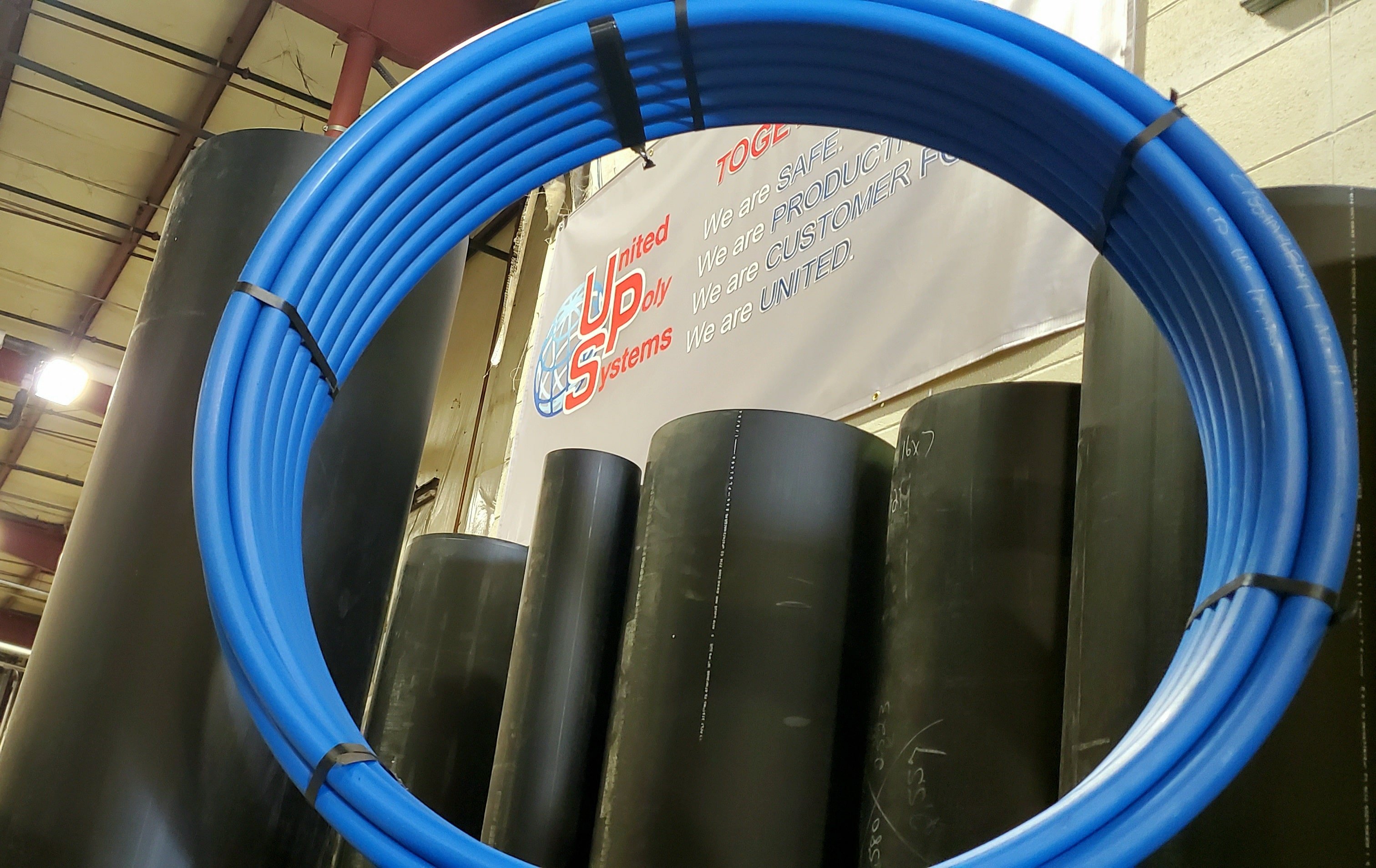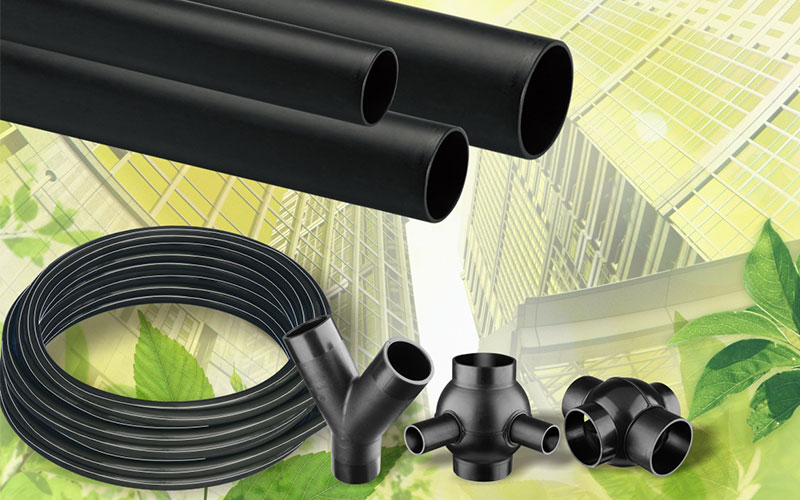Recognizing the Trick Conveniences of HDPE Pipeline for Water and Wastewater Administration
Making use of HDPE pipe in water and wastewater monitoring provides various advantages that warrant factor to consider. Its exceptional durability and lengthy life expectancy make it a preferred choice for lots of jobs. In addition, the product's resistance to deterioration and chemical damages boosts its integrity in different environments. The advantages extend past just longevity and resistance. Pipe Manufacturing Midland TX. Discovering its cost-effectiveness and ecological effect reveals much more compelling factors for its widespread adoption in modern-day facilities
Exceptional Sturdiness and Longevity

HDPE pipe sticks out for its phenomenal toughness and longevity, making it a preferred option in water monitoring systems. Created from high-density polyethylene, these pipelines can endure considerable stress and anxiety, guaranteeing trustworthy efficiency with time. Their durable nature allows them to endure extreme environmental conditions, including temperature changes and soil motions, which can trigger various other products to stop working.
The life expectancy of HDPE pipelines frequently exceeds 50 years, offering an economical remedy for communities and sectors alike. Furthermore, the material's lightweight residential or commercial properties streamline installment, decreasing labor expenses and timeframes. This sturdiness reduces the requirement for frequent fixings or substitutes, additionally improving its economic appeal.
In water monitoring applications, the integrity of HDPE pipes implies less disturbances and boosted service continuity, making them integral to lasting facilities development. The mix of toughness and durability solidifies HDPE's duty as a foundation in effective water management options.

Resistance to Corrosion and Chemical Damage
While several products yield to rust and chemical damage over time, HDPE pipelines show exceptional resistance, making them suitable for different water management applications. This strength originates from the molecular structure of high-density polyethylene, which is inherently non-reactive and does not wear away like metals or weaken from exposure to severe chemicals. Therefore, HDPE is highly effective in settings with aggressive materials, such as wastewater systems that might include acids, bases, and natural solvents.
Furthermore, HDPE pipes can hold up against ecological elements such as dirt acidity and saline conditions, additionally enhancing their viability for diverse applications (Pipe Manufacturing Midland TX). Their capability to keep structural honesty in time decreases the threat of leaks and failings, which is crucial in ensuring the security and integrity of water distribution and wastewater administration systems. Subsequently, the resistance to rust and chemical damages noticeably adds to the overall efficiency and long life of HDPE piping services
Cost-Effectiveness and Economic Advantages
When taking into consideration the financial ramifications of water monitoring systems, the cost-effectiveness of HDPE pipes ends up being noticeable. These pipelines provide lower setup and upkeep prices contrasted to traditional products like steel or concrete. Their lightweight nature simplifies transportation and installment, resulting in decreased labor costs. Furthermore, HDPE pipes display a long life expectancy, often exceeding 50 years, which translates to fewer replacements and long-term cost savings.
The resistance of HDPE to deterioration and chemical damages lessens the demand for pricey fixings and substitutes. The pipelines likewise support efficient water flow, reducing power prices linked with pumping systems. By reducing leaks and water loss, HDPE pipes add to substantial financial benefits for municipalities and sectors alike. On the whole, the initial investment in HDPE piping can yield substantial financial returns over the lifespan of the water monitoring system, making it a prudent choice for lasting facilities development.
Ecological Sustainability and Minimized Effect

Versatility and Flexibility in Setup
Due to their unique residential properties, HDPE pipelines use amazing flexibility and adaptability in setup, making them suitable for a vast array of applications. Their light-weight nature permits black pipe covers much easier handling and transportation, lowering labor costs and installment time. HDPE pipelines can be bent and formed to fit various surfaces and job demands, which is especially advantageous in testing environments.
Furthermore, their resistance to rust and chemical damage permits for installation in diverse setups without the need for specialized protective coatings. The capability to fuse joints develops a continuous, leak-free system, improving the total integrity and reliability of the setup. HDPE's adaptability also accommodates ground movement, decreasing the threat of damages in areas susceptible to moving dirt. On the whole, these qualities make HDPE pipes not only functional but also a favored selection for water and wastewater monitoring systems.
Frequently Asked Questions
Exactly How Does HDPE Pipe Contrast to PVC in Water Monitoring Applications?
HDPE pipeline supplies exceptional adaptability, resistance to rust, and resilience compared to PVC. Its lighter weight helps with much easier installment, while its lengthy life-span lowers substitute prices, making HDPE a recommended selection in water monitoring applications.
What Is the Life-span of HDPE Piping Under Typical Problems?
Under regular conditions, HDPE pipes can have a lifespan varying from 50 to 100 years. Their resilience and resistance to rust add to their long-term performance in numerous applications, making them a reputable option for infrastructure.
Are HDPE Pipes Recyclable After Their Life Span?
Yes, HDPE pipelines are recyclable after their life span. hdpe pipe fittings Midland TX. They can be processed and repurposed right into brand-new products, significantly reducing ecological effect and promoting sustainability within the industry, making them an eco-friendly selection for piping remedies
What Is the Installment Process for HDPE Pipes?
The installment process for HDPE pipes includes site prep work, trenching, pipe blend or mechanical joining, backfilling, and pressure screening. Appropriate techniques assure a long lasting and efficient system for transporting water and wastewater properly.
Can HDPE Water Lines Be Used for Both Safe And Clean and Non-Potable Water Systems?
Yes, HDPE pipelines can be made use of for both drinkable and non-potable water supply. Their flexibility, durability, and resistance to rust make them suitable for different applications, making certain risk-free and reliable transport of water in various contexts.